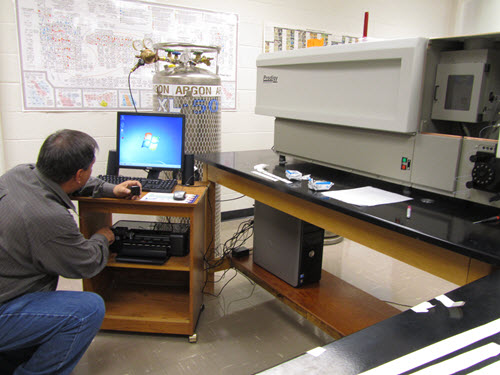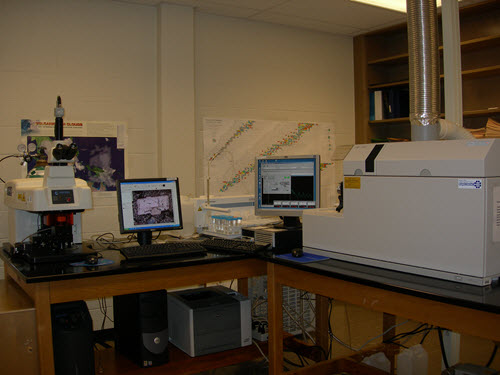GeoAnalytical Laboratory

Welcome to the TTU GeoAnalytical Laboratory. Our laboratory has been providing analyses of rocks, soils, water, and biological materials to the geologic and environmental research communities since 1985 with arrival of a Perkin-Elmer 3030 atomic absorption spectrometer. In 1988 a major milestone was achieved with the addition of our first Leeman Labs ICP-AES. Both machines are now retired. The two primary analytical tools currently in use at the TTU GeoAnalytical Laboratory are the Agilent 7500cs inductively coupled plasma quadrupole mass spectrometer (ICP-MS), acquired in 2007, and the Leeman Labs Prodigy High Dispersion inductively coupled plasma spectrometer (ICP-AES), installed in the spring of 2011. We have a New Wave UP213 Nd:YAG laser system that can be used in conjuction with the ICP-MS to analyze solid materials and an Agilent ASX-500 autosampler sample introduction system for dilute aqueous samples.
The GeoAnalytical Laboratory is a research oriented facility. We work with undergraduates, graduate students, and professors to determine the chemical composition of their research samples. As a department facility, our first priority is the support of Texas Tech Geosciences students and faculty in their research endeavors. We work with students and faculty from other TTU and TTU HSC departments, and accept contract work.
Contact
For more information, including costs and to schedule analytical work, please contact Kevin Werts.
Kevin Werts, Ph.D. (kevin.werts@ttu.edu)
Research Scientist
Department of Geosciences, Science 207
Phone: (806) 834-2948
Directions to the Lab
Enter the Texas Tech University campus via the main gate and travel around Memorial Circle to the Science Building (Geosciences and Physics). We are located on the second floor of the Science Building in Room 206.
Instruments

ICP-AES
The TTU GeoAnalytical Laboratory purchased a new Prodigy High Dispersion ICP-AES from Leeman Labs in early 2011. The ICP-AES can analyze concentrated aqueous solutions (as high as 3% total dissolved solids). The TTU ICP-AES analyzes whole rock samples for major elements (SiO2, TiO2, Al2O3, Fe2O3, MnO, MgO, CaO, Na2O, K2O, P2O5) and trace elements (Ba, Rb, Sr, Zr, Y, Sc, V, Ni, Cr, Cu, Zn, Nb, Be). We also commonly analyze environmental samples (water and soil), and biological samples (kidney, liver, urine, etc) for typical EPA metals including Cu, Zn, Fe, Mn, Co, Sr, Mg, Ni, Cr, Cd, Mo, As, Pb, and alkalies. Minimum sample size is a 10 ml solution.
LA-ICP-MS
In 2006 we announced the acquisition of an Agilent 7500cs inductively coupled plasma quadrupole mass spectrometer (ICP-MS) and a New Wave UP213 Nd:YAG laser system. The laser ablation sampling system can be used in conjunction with the ICP-MS to study trace element abundances in a wide range of solid materials. In situ trace element analysis can be made in minerals, natural glasses, fused whole rock glasses, and compositional zoning within individual mineral crystals. Trace element analysis can also be provided for non-geological materials if appropriate standards are available.
X-Ray Fluorescence and Fusions
Major element (e.g. SiO2, TiO2, Al2O3, Fe2O3, MnO, MgO, CaO, Na2O, K2O, P2O5) analysis of rock samples is available by XRF and trace elements by LA-ICP-MS. We use a lithium metaborate flux to fuse samples into glass discs. Loss on ignition (LOI) is included with whole rock analysis and requires 1-4 g of sample powder

Analysis Request
When requesting an analysis, try to include as much of the following information as possible in your initial email:
- Types of samples
- Number of samples
- Elements to be analyzed
- Concentration levels (if known)
- Desired level of participation during analysis
- Timeline
- Objective of project
- Any previously published papers with similar analytical methods
- Contact information
Procedures
Listed below are common operating procedures followed in the lab. Students: before coming to the lab, check here for any procedures related to what you are about to do. Please note that possessing a copy of the procedure alone does not give you any permission to operate any of the machinery without supervision.
Standards
Provided here are the concentrations for common standards used in the lab. See the lab staff for help choosing samples if you are unfamiliar with the process.
- USGS and in-house standards
- Services and Fees
Related Links
Geology and Geophysics
-
Address
Texas Tech University, 2500 Broadway, Lubbock, TX 79409 -
Phone
806.742.3102 -
Email
geosciences@ttu.edu
